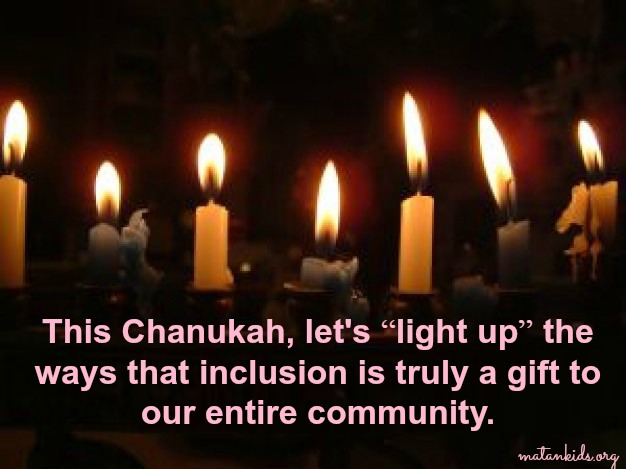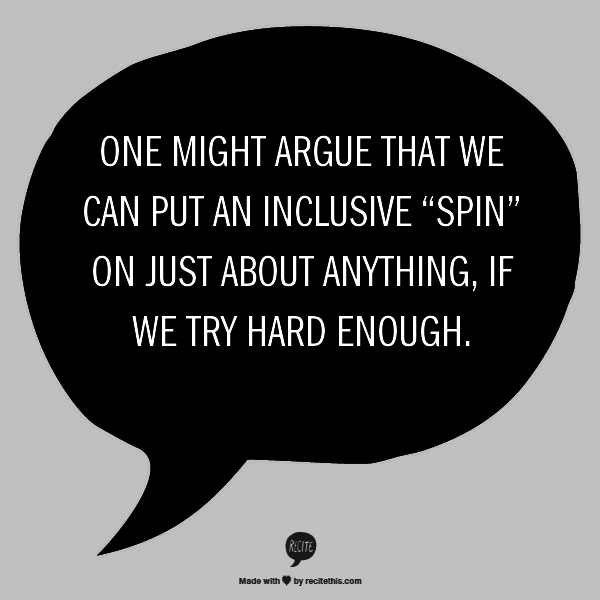Written by Lisa Friedman, Matan’s Manager of Social Media and Alumni Networks
 Chanukah is a festival all about light, centering around the ritual of lighting candles every night for 8 nights. One might even see it as an opportunity to “light up” that which is important to us – or that which we weren’t able to see during relative “darkness”. Consider taking a few moments this Chanukah to see things in a “new light”. The following comparisons, for example, may help to “light up” the ways that inclusion is truly a gift to our entire community.
Chanukah is a festival all about light, centering around the ritual of lighting candles every night for 8 nights. One might even see it as an opportunity to “light up” that which is important to us – or that which we weren’t able to see during relative “darkness”. Consider taking a few moments this Chanukah to see things in a “new light”. The following comparisons, for example, may help to “light up” the ways that inclusion is truly a gift to our entire community.
The Celebration of a Miracle
The story of Chanukah focuses on a miracle. Here the emphasis is on a tiny pot of oil. As the story goes, the Maccabees, upon reaching the destroyed temple, found a small bit of oil to light their holy space. Thinking it could only last one night, but lighting it anyway, this oil lasted for eight nights. The Maccabees underestimated what was right in front of them. Imagine if they had never tried to light the oil. How many of us have underestimated the ability of someone with a disability? When we hold the same expectations for those with disabilities as we do for anyone else, we open ourselves to a world of possibility. Rich opportunities await us every day. Maybe not for miracles, but certainly to see every person’s full potential.
The Shamash – We All Need a Helper!
Back to the oil. In celebration of it lasting eight nights, during Chanukah we light a special, nine-branched menorah (lamp). The eight candles represent the eight days, and the ninth is the shamash, an attendant, or helper. From the shamash we can learn that there is no shame in asking for help. Ever. The beauty of Chanukah is that no other candle on our chanukiah (menorah) can be lit without the shamash (helper). When we set an example of relying on one another for success, we create a powerful model of inclusion that enables all to experience the light.
The Growing Light
The Talmud records a debate between two schools of thought in lighting the Chanukah candles. The House of Hillel says to light the candles in ascending order, with one candle the first night and eight the last night (the way that became the tradition), whereas the House of Shammai argues that they should be lit in descending order, with eight candles on the first night and one on the last. Hillel’s approach represents counting the number of days as they are actualized, with increasing anticipation and joy, rather than Shammai’s method of simply counting the days of the holiday that remains. This, too, is a metaphor for the power of inclusion. When we engage in inclusive practice, we increase both opportunities and our own capacities for increased inclusion.
Playing Dreidel
 And that’s the point. Everything we do, everything we say – the way we act, the way we treat one another, the way we think about community – either is or is not inclusive. Inclusion is not the Chanukah (or any other) program you run where you specifically invite people with disabilities. Inclusion is making sure that every program, every event, and really every day, fully welcomes everyone and that everyone knows he or she has a place to participate.
And that’s the point. Everything we do, everything we say – the way we act, the way we treat one another, the way we think about community – either is or is not inclusive. Inclusion is not the Chanukah (or any other) program you run where you specifically invite people with disabilities. Inclusion is making sure that every program, every event, and really every day, fully welcomes everyone and that everyone knows he or she has a place to participate.
